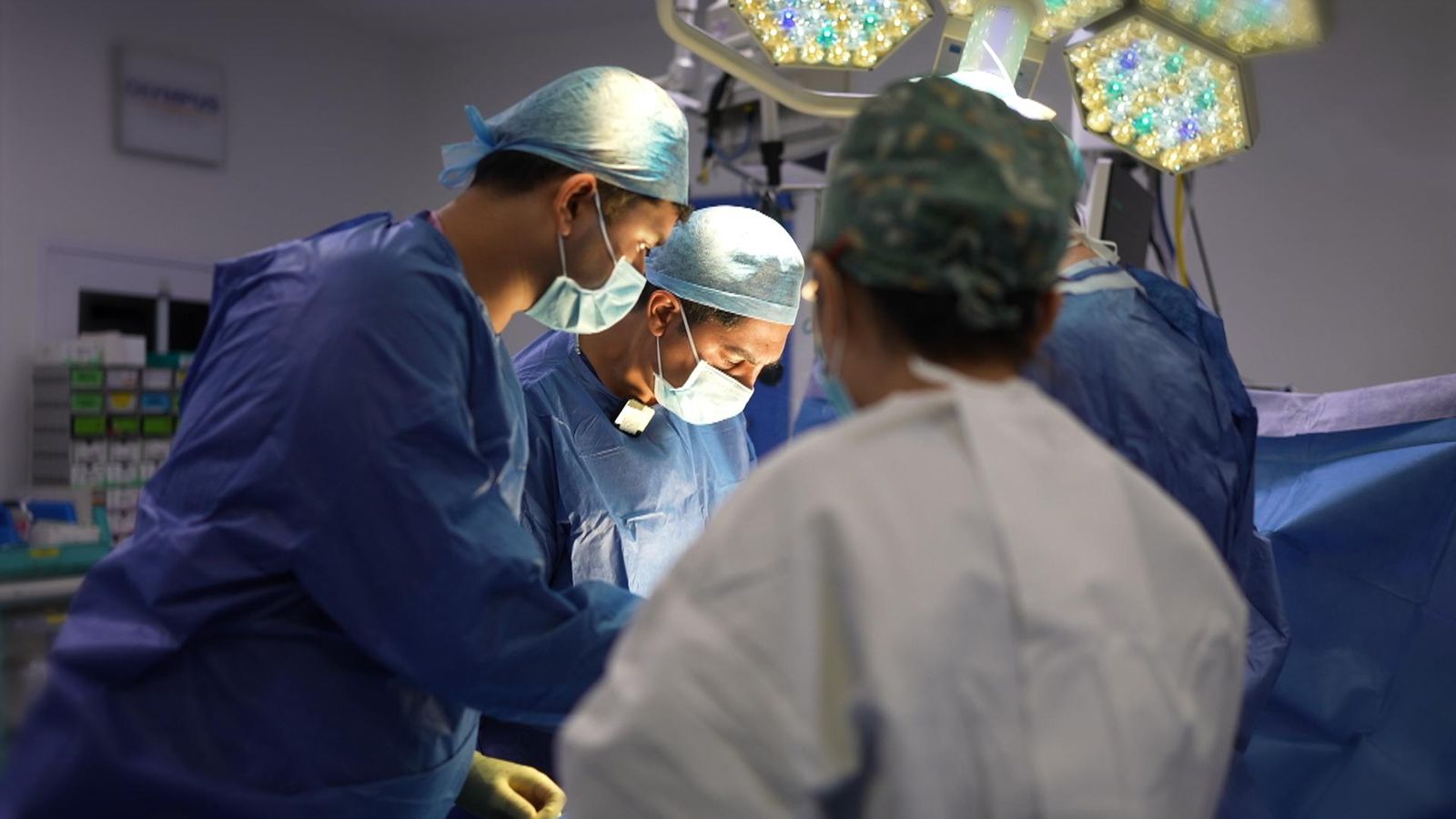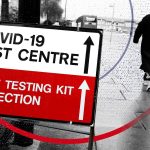Every day at 8am in the Royal Free Hospital in north London, nursing and ward managers meet in the ops room to decide who can get an operation that day based on what beds are available.
Sometimes, if there’s been a heavy intake of unexpected emergencies, then planned surgeries are postponed.
However, 10 minutes into the meeting last Friday, theatre manager Ahmad Turab was able to call up to the cancer ward on the seventh floor to say all the planned procedures can go ahead.
It was a relief for Peter Gibson, 71. It meant he would be getting his tumour out that morning.
Mr Gibson, a Christian pastor, is hugely grateful for his care at the Royal Free Hospital, but thinks the government is playing games when it comes to negotiating with medics over pay and conditions.
“My care has been exemplary,” he says.
“I’ve got lots of friends who are in the NHS. I think they deserve a lot more than they are asking for.
“And the people who hold the purse strings in the government, I think they’re just playing God. Probably trying to break the NHS, so we all go private.”
Mr Gibson’s operation goes well. The Royal Free Hospital has the largest neuroendocrine tumour service in the UK, and does the most operations in the country on complex tumours in the gut.
Doctors at the hospital say they kept cancer surgery going during the peaks of the pandemic, but the virus has left a legacy.
Reza Mirnezami, the consultant colorectal and endocrine tumour surgeon who operated on Mr Gibson, told Sky News: “The footprint that COVID’s left on the work we’re doing now, which is still real, and pretty immense.
“We’ve got a huge backlog, primarily of patients waiting to have surgery for benign conditions.”
He adds: “During COVID, people were not going to their GPs enough to investigate things like bleeding from the back passage or unusual gastrointestinal symptoms.
“And there was a delay to presentation, and we know, especially with cancer, getting to things early gives you the best chance of having treatment to cure it. So, unfortunately, we have seen a lot of patients presenting with very advanced disease.”
Read more:
Can the NHS survive? Be in the audience for live debate
Ambulance workers strike for third time in five weeks as pay and staffing dispute rumbles on
Ministers accused of having ‘sinister reason’ for ‘not doing a deal’ with nurses
Research from the Office of National Statistics (ONS) shows that nationwide 1,000 more people are dying every week than expected.
Dr Adrian Boyle, president of the Royal College of Emergency Medicine (RCEM), told a parliament committee on Tuesday: “We have the second lowest number of beds in the OECD [Organisation for Economic Co-operation and Development].
“We run our hospitals far, far too full with far too high occupancy levels. They are hideously high.
“[Investment] is a step in the right direction, but it’s going to take a long time to recover from. Things have been going wrong for quite some time and have come to a head over December.”
The excess death rates have left questions about the impact of budget cuts and COVID on hospital care – in England and Wales there were more than 17,000 registered deaths in the week to 13 January.
That’s about 20% more weekly deaths compared to the five-year average, and the highest figure in nearly two years.
It’s not just delays in operations, but pressures on emergency care, ambulances, and A&E waiting times.
In the Royal Free Hospital emergency department, Charlotte Kramer, a senior staff nurse, runs through the patient list. I ask if she minds telling me what the longest waiting times are today.
“There’s no point you being here unless you show people what it’s really like,” she says. “So, the longest waiting time we have in A&E [today] is 27 hours for an 84-year-old gentleman who is waiting for a medical bed.”
There are plenty of others waiting for long hours, and it tends to be those needing geriatric care, where there’s a bottleneck due to slow discharges, often because of the lack of care in the community.
It means A&E nurses are being diverted to care for elderly patients while they wait for a bed on the ward, and that more patients pile up at the emergency department entrance.
Despite creating some new bed areas in corridors, sometimes there still isn’t space.
Emergency medicine registrar Anushka Saroop says: “In the last couple of months, we were seeing patients at the back of the ambulances that have their blood test done. The ambulance crew have been really helpful taking the patients to have their scans, but we’ll have to bring them back on to the ambulance.”
She adds: “I think one of the things that we’re focused on is we have no beds. There are a lot of delayed discharges from the hospital – things like social care – getting those things in place would allow us to move ahead a bit better.
“More staff are always welcome, they are much needed. Better pay and conditions for doctors, nurses, domestics, everyone across the board has been working really hard, really diligently – we’ve been really flexible to not compromise patient care, but you can only work at that intensity without becoming exhausted.”
Asked if she thinks the problems in A&E are contributing to higher death rates, Dr Saroop says: “It’s a high risk because we’re seeing higher volumes of patients who are more frail, they’re more unwell, they’re sicker. And we’re doing that with the same amount of resources and the same amount of staff.
“The clinician-to-patient ratio has widened greatly. So, there’s the potential for that happening.”
Click to subscribe to the Sky News Daily wherever you get your podcasts
The hospital doubled its A&E department size during the pandemic – taking over a physiotherapy space – but there has since been no let-up, and they have often more than filled the overspill waiting room, with sometimes up to 50 patients arriving in a single hour.
Strike action is another strain on the service but, wheeling an 89-year-old patient into the emergency department, ambulance driver Tim Wilmott says it’s necessary: “The NHS can be a bottomless pit of money. But more money would be great.
“I think striking is the only way that us and the nurses and other sectors of society have got to make our feelings known to the government.”
The people, problems and pressure keep piling through the hospital doors.
The dedication of the medical teams is praised by every patient we meet – but it can’t be taken for granted.






















